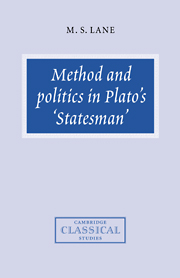Part I - Method
Published online by Cambridge University Press: 12 September 2009
Summary
Introduction
Socrates has asked the Eleatic Stranger whether people in his country consider sophist, statesman and philosopher one, two, or – there being three names – ‘divide’ (diairoumenoi) them into three ‘classes’ (genē) and ascribe a class to each name (So. 217a). The Stranger answers, ‘three’, but says that it is not a small or easy thing to ‘define’ each ‘clearly’ (So. 217b): he undertakes first to search for and ‘make plain by argument’ what the sophist is. The implication is that the inquiry set by Socrates will require the establishment of definitions of sophist, statesman, and philosopher. This task is undertaken and achieved for sophist and statesman in the eponymous dialogues: definition is what they set out to give and claim to have achieved.
Both inquiries contrast the definition sought with the mere assertion of a name, though the having of the name in common (So. 217c) is the starting point for the argument. Both involve separating the expertise in question from a host of rival arts, or forms of expertise, claiming the name for themselves. (Some of these are assigned roles as subordinate or collaborative kinds of expertise, while others are unmasked as impostors). And both define a paradigmatic example in order to originate, or complete, their search. Definition is achieved by dividing kinds of knowledge in order to connect them in an analytical account (logos) giving common meaning to the name.
- Type
- Chapter
- Information
- Method and Politics in Plato's Statesman , pp. 13 - 98Publisher: Cambridge University PressPrint publication year: 1998



